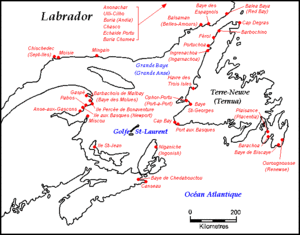Algonquian–Basque pidgin
| Algonquian–Basque pidgin | |
|---|---|
| Region | Gulf of Saint Lawrence |
| Era | 16th to 18th century |
|
Basque-based pidgin | |
| Language codes | |
| ISO 639-3 |
None (mis) |
| Glottolog |
basq1252[1] |
|
Basque fishing sites (in French) | |
The Algonquian–Basque pidgin was a pidgin spoken by the Basque whalers and various Algonquian peoples.[2] It was spoken near the Saint Lawrence River. It was last attested in 1710.[3]
There were three groups of First Nations that the Basque people distinguished. The ones with which they had good relations were the Montagnais and the Iroquois. They also knew of the Inuit, whom they considered hostile. The Basque people referred to them as the Montaneses, the Canaleses and the Esquimoas, respectively.[4]
Example words
| Pidgin | Original language | English translation |
|---|---|---|
| Normandia | Normandia (eu), literally "Normandy" | French |
| kir | kir (mic) | you |
| ania | anaia (eu) | brother |
| capitana | capitaina (eu), kapitaina in Standard Basque | captain |
| endia | andia (eu), handia in Standard Basque | large |
| chave | chave (roa) | know |
References
- ↑ Nordhoff, Sebastian; Hammarström, Harald; Forkel, Robert; Haspelmath, Martin, eds. (2013). "Basque-Amerindian Pidgin". Glottolog. Leipzig: Max Planck Institute for Evolutionary Anthropology.
- ↑ Anthropological Linguistics vol. 31, nos. 3-4
- ↑ Peter Bakker (1989): "The language of the coast tribes is half basque", Antropological linguistics 31: 117-147.
- ↑ Echoes from the Past
- ↑ Gray, Edward (2000). The Language Encounter in the Americas, 1492-1800. Berghahn Books. p. 342. ISBN 9781571812100.
